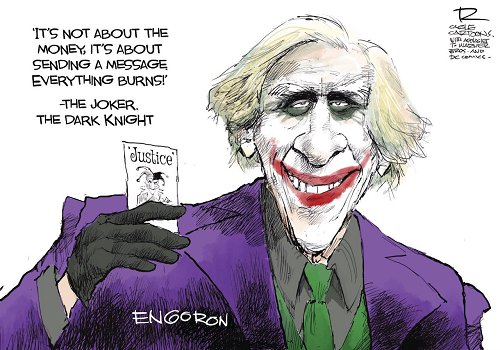THE DEMOCRAT RUINATION OF OUR JUSTICE SYSTEM
 Oscar Wilde wrote that “moderation is a fatal thing. Nothing succeeds like excess.” Justice Arthur Engoron took that line to heart with his absurd imposition of $455 million in fines and interest against Donald Trump and his corporation.
Oscar Wilde wrote that “moderation is a fatal thing. Nothing succeeds like excess.” Justice Arthur Engoron took that line to heart with his absurd imposition of $455 million in fines and interest against Donald Trump and his corporation.
It succeeded wonderfully with New Yorkers, who celebrated the verdict like a popular public execution. It also worked wonderfully to make it difficult to appeal.
Much of the criticism of the decision focused on the unprecedented use of the law and the excessive size of the fine. The New York statute has been on the books for decades and has always been something of an anomaly in not requiring an actual victim or loss to justify disgorgement or fines.
Even the New York Times agreed that it could not find a single case in history where this statute was used against an individual or a company that did not commit a criminal offense, go bankrupt, or leave financial victims.
Engoron then combined that unprecedented application with an equally extraordinary penalty, which is greater than the gross national product of some countries.
He disgorged hundreds of millions in a case where not one dollar was lost by anyone. Indeed, the “victims” wanted to get more business from Trump and are now being prevented from doing so by Engoron.
There is also an added inequity to Engoron’s decision.
Under New York law, Trump cannot appeal this ruling without depositing the full amount, including interest, in a court account. Even for Trump, $455 million is hard to come by. Likewise, a bond would require a company to guarantee payment for a defendant who has been barred from doing business in New York and is facing the need to liquidate much of his portfolio.
Nothing succeeds like excess for judges like Engoron. By imposing this astronomical figure, he can make it difficult or impossible for a defendant to appeal, absent declaring bankruptcy or selling off assets at distress prices.
The excessive fine and its basis raise serious statutory and constitutional questions. Many of us believe it should be substantially reduced or tossed out entirely.
First, however, Trump must come up with almost half a billion dollars to park with the court. Even with a bond, the high costs of securing a guarantor could come at a premium. It would cost a fortune to the bond holder just to carry the risk even if Trump prevails on appeal.
The combination of the draconian fine and the threshold deposit for appeal has produced a shudder throughout the New York business community.
The city is already experiencing an exodus of businesses and individuals from the top tax brackets. Rising crime, taxes, and eat-the-rich politics have made New York a hostile environment for businesses. At a time with rising costs from undocumented migrants, even Mayor Eric Adams is alarmed about the loss of his high earners.
The case brought by Attorney General Letitia James was unnerving for many. James previously sought to dissolve the National Rifle Association and campaigned on bagging Trump on some unnamed offense. The ecstasy expressed by many in the city reinforced the image of a thrill-kill chase around the island of Manhattan, like a corporate version of “Lord of the Flies.”
Watching the celebrations probably caused many executives to check time shares in Florida. New York Gov. Kathy Hochul has rushed to assure businesses that there is “nothing to worry about” after the corporate public execution of Trump and his company.
But the best that politicians like Hochul and Adams can offer is that you have nothing to fear from confiscatory actions unless you are Trump in New York.
Which is precisely why this decision should be overturned.
What is clear is that this case would never have been brought, let alone result in this massive fine, except for politics.
For example, if you are the NRA, James will seek your destruction for financial irregularities, but if you are Black Lives Matter or Al Sharpton’s National Action Network, there is little real risk in such controversies.
If the only protection in New York is the discretion of figures like James, few businesses would relish the future. The message is that you can expect blind and equal justice so long as you don’t run afoul of the Democrats in power.
If you are unpopular, you could be looking at not only unprecedented actions and fines, but a need to virtually liquidate your assets just to be able to appeal a decision.
This should shock the conscience of anyone concerned about the integrity and fairness of the New York legal system. Confiscatory fines and required deposits leave not just defendants but the entire system bankrupt.
Jonathan Turley, constitutional law scholar and legal analyst, is the Shapiro Chair for Public Interest Law at The George Washington University Law School.

